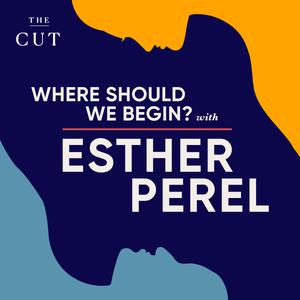
Modern Love
The New York Times
For 20 years, the Modern Love column has given New York Times readers a glimpse into the complicated love lives of real people. Since its start, the column has evolved into a TV show, three books and a podcast. Each week, host Anna Martin brings you stories and conversations about love in all its glorious permutations, dumb pitfalls and life-changing moments. New episodes every Wednesday. Listen to this podcast in New York Times Audio, our new iOS app for news subscribers. Download now at nytimes.com/audioapp
- 29 minutes 56 secondsPeter Gallagher’s Marriage Advice? Don’t Get Divorced.
Actor Peter Gallagher (Sex, Lies, & Videotape and The O.C.) met his wife, Paula Harwood, over forty years ago in college in a stairwell meet-cute. Since then, they’ve maintained a loving marriage and managed to raise a family while navigating the world of show business.
We talked to Peter on his 41st wedding anniversary, and he read us the Modern Love essay “Failing in Marriage Does Not Mean Failing at Marriage” by Joe Blair. Despite the essayist being kicked out of the house by his wife five times, the couple managed to remain married and learn that a relationship can mean trying together and failing together. Reflecting on the essay, Peter gave us his advice for staying the course.
Peter Gallagher will be performing on Broadway this fall in Delia Ephron’s play ‘Left on Tenth.’
22 May 2024, 9:00 am - 30 minutes 45 secondsLiza Colón-Zayas, of ‘The Bear,’ on Loving Someone Who’s in the Fight of Their Life
On the Emmy- and Peabody-winning series “The Bear,” Liza Colón-Zayas plays Tina Marrero, a cook at the Chicago restaurant at the center of the story. Tina and her fellow workers are in a constant struggle for the survival of their restaurant, and they fight just as fiercely with one another. Only at rare moments do we see them drop the tough exterior and show one another love or respect.
Today, Colón-Zayas reads “A Web Between Her Body and Mine,” by Karen Paul. It’s a Modern Love essay about two friends who also met at work, but have a different kind of bond: Karen has no problem showing affection to her best friend, Miriam. But after Miriam has a terrible accident, Karen finds herself in uncharted territory, not certain when, or how, to support her. It’s a story Colón-Zayas says she relates to personally, and her reaction to it takes her by surprise.
15 May 2024, 9:00 am - 25 minutes 42 seconds¡Hola Papi!, Does My Grandmother Need to Know I’m Gay?
John Paul Brammer writes the “¡Hola Papi!” advice column for The Cut at New York magazine, answering questions like, “Why am I dreaming about sex with a man when I’m a lesbian?” Or, “What if my partner judges me for writing smut?” This candor has given John Paul an intimate connection with his readers. However, as today’s episode reveals, he doesn’t think we necessarily need that level of openness with all of our loved ones.
Ahead of Mother’s Day, Brammer reads an essay about a recent college graduate who sets out to spend the summer exploring his sexuality, but whose plans are derailed by his duty to his grandmother. It’s called “Young, Gay and Single Among the Nuns and Widows” by Kevin Hershey. Brammer says it’s “bizarre” how much this essay resonates with his own life.
8 May 2024, 9:00 am - 30 minutes 4 secondsEmily Ratajkowski Can Take Care of Herself, but a Little Help Would Be Nice
Emily Ratajkowski is doing a balancing act many famously beautiful women have to perform. In her 2021 book “My Body,” she reflects on what it’s been like to build a career based on her public image, and her struggle to control that image in an industry largely run by men. Since getting divorced a few years ago, she’s been thinking a lot about gender dynamics and the type of agency she wants to have in dating, too.
Today, Ratajkowski reads “Why I Fell for an ‘I’m the Man’ Man,” by Susan Forray. Forray is also a successful, self-sufficient woman, dating after divorce. She’s surprised to find herself falling for a man with old-fashioned ideas about who does what in a relationship. (He pays for dinner, handles the finances and initiates sex). As a single mom who handles everything, Ratajkowski says, she can relate to the desire to be cared for once in a while. And that doesn’t have to mean playing into a sexist stereotype.
1 May 2024, 9:00 am - 26 minutes 50 secondsLaufey, Gen Z’s Pop Jazz Icon, Sings for the Anxious Generation
Laufey, the 25-year-old singer-songwriter, has risen to prominence by taking the trials of today’s dating world — casual relationships, no labels and seemingly endless swiping on apps — and turning them into timeless love songs.
Today, Laufey reads Coco Mellors’s essay, “An Anxious Person Tries to Be Chill,” which is about a woman trying to work through her deep-seated relationship anxieties and attachment issues in an on-again, off-again situationship. Laufey says she, too, has been an anxious partner. While she thinks a toxic relationship, like the one in the essay, can make for a great love song, she now knows secure relationships can make beautiful music, too.
24 April 2024, 9:00 am - 34 minutes 37 secondsWhy John Magaro of ‘Past Lives’ Could Never Love a Picky Eater
The actor John Magaro is picky about whom he goes to dinner with. Magaro is an adventurous eater. So whether he’s buying offal from the butcher, making stews from the 1800s or falling in love over a plate of rabbit, he says it’s important to him that the people he shares a meal with are willing to be curious. For Magaro, it’s about more than personal preferences. Sharing a meal and connecting with other people, he says, is the bedrock of society.
Magaro played Arthur in “Past Lives,” one of our favorite movies last year. His character is constantly working to understand his wife on a deeper level. And Magaro sees that quality in “My Dinners With Andrew,” by Sara Pepitone, a Modern Love essay about food as a love language, and a series of dinners that make, and break, two relationships.
17 April 2024, 9:00 am - 28 minutes 1 secondEsther Perel on What the Other Woman Knows
Over the last two decades, Esther Perel has become a world-famous couples therapist by persistently advocating frank conversations about infidelity, sex and intimacy. Today, Perel reads one of the most provocative Modern Love essays ever published: “What Sleeping With Married Men Taught Me About Infidelity,” by Karin Jones.
In her 2018 essay, Jones wrote about her experience seeking out no-strings-attached flings with married men after her divorce. What she found, to her surprise, was how much the men missed having sex with their own wives, and how afraid they were to tell them.
Jones faced a heavy backlash after the essay was published. Perel reflects on why conversations around infidelity are still so difficult and why she thinks Jones deserves more credit.
Esther Perel is on tour in the U.S. Her show is called “An Evening With Esther Perel: The Future of Relationships, Love & Desire.” Check her website for more details.
10 April 2024, 9:00 am - 25 minutes 25 secondsThe Second Best Way to Get Divorced, According to Maya Hawke
When Maya Hawke’s famous parents got divorced, she was just a little kid trying to navigate their newly separate worlds. Paparazzi aside, Maya’s experience of shuttling between two homes was still more common than the arrangement described in the essay Maya reads: “Our Kinder, Gentler, Nobody-Moves-Out Divorce,” by Jordana Jacobs.
By staying under one roof, Jacobs and her ex-husband spared their young son the distress of having to go back and forth. But this “dad upstairs, mom downstairs” arrangement also meant that Jacobs had to overhear her ex falling in love with his new partner.
Today, Hawke reflects on the bittersweet family portrait in Jacobs’s essay, and on divorce’s role in Hawke’s own upbringing.
Maya’s latest album, “Chaos Angel,” drops May 31.
3 April 2024, 9:00 am - 30 minutes 37 secondsHow to Be Real With Your Kids
Penn Badgley has made a career out of playing deeply troubled characters. From his role as Joe Goldberg on the Netflix series “You” to Dan Humphrey on “Gossip Girl,” Badgley has shown many times over how obsession and delusion can destroy love.
In his personal life, though, Badgley says he’s not doing too much brooding. He’s a father and a stepfather, and he opens up about the importance of being vulnerable with his kids. Badgley reads “Watching Them Watching Me” by Dean E. Murphy, an essay about a father who can no longer hide his emotions from his sons after they all experience a devastating loss.
27 March 2024, 9:00 am - 30 minutes 5 secondsWhy Samin Nosrat Is Now ‘Fully YOLO’
The chef Samin Nosrat lives by the idea that food is love. Her Netflix series, “Salt, Fat, Acid, Heat,” and the James Beard Award-winning cookbook that inspired it, were about using food to build community and forge connections. Since then, all of her creative projects and collaborations have focused on inspiring people to cook, and eat, with their friends and loved ones.
After the recent loss of her father, Samin has gained an even deeper understanding of what it means to savor a meal — or even an hour — with loved ones. This week, she reads an essay about exactly that: “You May Want to Marry My Husband” by Amy Krouse Rosenthal. It’s one of the most-read Modern Love essays ever.
20 March 2024, 9:00 am - 30 minutes 23 secondsBrittany Howard Sings Through the Pangs of New Love
Brittany Howard, the five-time Grammy Award-winning singer, makes vibrant, dynamic music about love.
As the frontwoman of the band Alabama Shakes, she was celebrated for the power and emotionality of her voice. When she began her solo career in 2019 with “Jaime,” an album named after and dedicated to her older sister, who died at 13, Howard revealed new dimensions of her songwriting and herself.
Her latest album, “What Now,” captures the intensity of processing the past and starting anew. Today, Howard reads a Modern Love essay about the courage it takes to fall back in love: “Was She Just Another Nicely Packaged Pain Delivery System?” by Judith Fetterley.
13 March 2024, 9:00 am - More Episodes? Get the App
Your feedback is valuable to us. Should you encounter any bugs, glitches, lack of functionality or other problems, please email us on [email protected] or join Moon.FM Telegram Group where you can talk directly to the dev team who are happy to answer any queries.
 Where Should We Begin? with Esther Perel
Where Should We Begin? with Esther Perel
 Love Letters
Love Letters
 Life Kit
Life Kit
 This American Life
This American Life
 Death, Sex & Money
Death, Sex & Money
 Dear Sugars
Dear Sugars